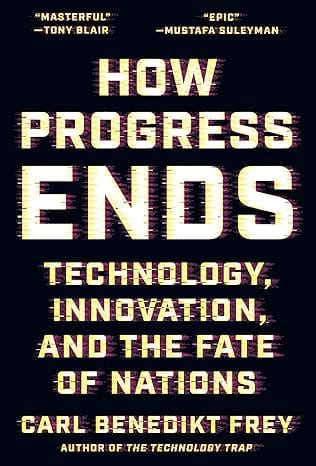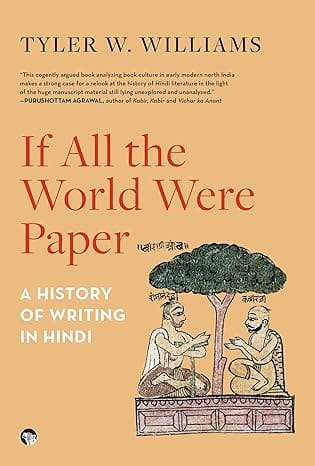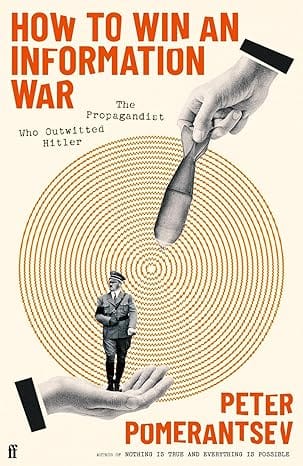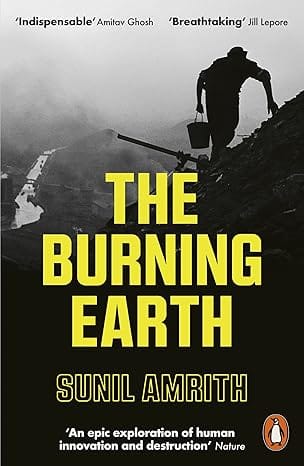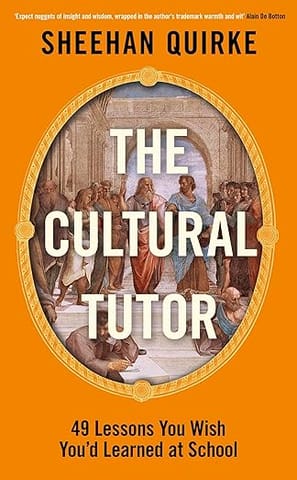WELCOME TO MIDLAND BOOK SHOP!
SHOP FOR
- Non-ficton
- Non-ficton
- Contemporary Fiction
- Contemporary Fiction
- Children
- Children
- Comics & Graphic Novels
- Comics & Graphic Novels
- Non-Fiction
- Non-Fiction
- Fiction
- Fiction
Shop No.20, Aurobindo Palace Market, Hauz Khas, Near Church +91 9818282497 | 011 26867121 110016 New Delhi IN
Midland The Book Shop ™
Shop No.20, Aurobindo Palace Market, Hauz Khas, Near Church +91 9818282497 | 011 26867121 New Delhi, IN
+919871604786 https://www.midlandbookshop.com/s/607fe93d7eafcac1f2c73ea4/677cda367903fd013d69b606/without-tag-line-480x480.png" [email protected]9780691287287 68d68028fdfed15459e23167 How Progress Ends Technology, Innovation, And The Fate Of Nations https://www.midlandbookshop.com/s/607fe93d7eafcac1f2c73ea4/68d68029fdfed15459e2316f/81kgkxqlyvl-_sy466_.jpg 9780691287287
How 1,000 years of global history show why technological and economic progress is often followed by stagnation and even collapse
In How Progress Ends, Carl Benedikt Frey challenges the conventional belief that economic and technological progress is inevitable. For most of human history, stagnation was the norm, and even today progress and prosperity in the world’s largest, most advanced economies-the United States and China-have fallen short of expectations. To appreciate why we cannot depend on any AI-fueled great leap forward, Frey offers a remarkable and fascinating journey across the globe, spanning the past 1,000 years, to explain why some societies flourish and others fail in the wake of rapid technological change.
By examining key historical moments-from the rise of the steam engine to the dawn of AI-Frey shows why technological shifts have shaped, and sometimes destabilized, entire civilizations. He explores why some leading technological powers of the past-such as Song China, the Dutch Republic, and Victorian Britain-ultimately lost their innovative edge, why some modern nations such as Japan had periods of rapid growth followed by stagnation, and why planned economies like the Soviet Union collapsed after brief surges of progress. Frey uncovers a recurring tension in history: while decentralization fosters the exploration of new technologies, bureaucracy is crucial for scaling them. When institutions fail to adapt to technological change, stagnation inevitably follows. Only by carefully balancing decentralization and bureaucracy can nations innovate and grow over the long term-findings that have worrying implications for the United States, Europe, China, and other economies today.
Through a rich narrative that weaves together history, economics, and technology, How Progress Ends reveals that managing the future requires us to draw the right lessons from the past.
In How Progress Ends, Carl Benedikt Frey challenges the conventional belief that economic and technological progress is inevitable. For most of human history, stagnation was the norm, and even today progress and prosperity in the world’s largest, most advanced economies-the United States and China-have fallen short of expectations. To appreciate why we cannot depend on any AI-fueled great leap forward, Frey offers a remarkable and fascinating journey across the globe, spanning the past 1,000 years, to explain why some societies flourish and others fail in the wake of rapid technological change.
By examining key historical moments-from the rise of the steam engine to the dawn of AI-Frey shows why technological shifts have shaped, and sometimes destabilized, entire civilizations. He explores why some leading technological powers of the past-such as Song China, the Dutch Republic, and Victorian Britain-ultimately lost their innovative edge, why some modern nations such as Japan had periods of rapid growth followed by stagnation, and why planned economies like the Soviet Union collapsed after brief surges of progress. Frey uncovers a recurring tension in history: while decentralization fosters the exploration of new technologies, bureaucracy is crucial for scaling them. When institutions fail to adapt to technological change, stagnation inevitably follows. Only by carefully balancing decentralization and bureaucracy can nations innovate and grow over the long term-findings that have worrying implications for the United States, Europe, China, and other economies today.
Through a rich narrative that weaves together history, economics, and technology, How Progress Ends reveals that managing the future requires us to draw the right lessons from the past.
Review
“In How Progress Ends, Carl Benedikt Frey gives a bold answer to one of history’s-and humanity’s-most essential questions: what drives technology and innovation? Epic in scope but packed with rigorous detail, it looks at what creates and reverses societal gains, asks how we should best manage the pursuit of new technologies, and hints at what, in the midst of an AI revolution, happens next. One of the key thinkers in the field, Frey delivers a grand, urgent must-read for anyone who cares about our past, present, and future.”-Mustafa Suleyman, CEO of Microsoft AI
“Debates about AI fluctuate between hopes that it will bring us boundless capabilities and riches and fears that it will reduce us to servitude or worse. But in How Progress Ends, Carl Benedikt Frey shows that the real question is how human creativity and innovation will adapt to the age of powerful AI. I can’t imagine a better place to find answers than this far-ranging, intelligent book, which reminds us that human institutions and culture have always been critical to innovation and progress.”-Daron Acemoglu, Nobel Prize–winning economist and coauthor of Power and Progress: Our Thousand-Year Struggle Over Technology and Prosperity
“Frey masterfully reveals why some nations thrive while others stumble in periods of technological upheaval. At a time when AI reshapes our world, this bo
“Debates about AI fluctuate between hopes that it will bring us boundless capabilities and riches and fears that it will reduce us to servitude or worse. But in How Progress Ends, Carl Benedikt Frey shows that the real question is how human creativity and innovation will adapt to the age of powerful AI. I can’t imagine a better place to find answers than this far-ranging, intelligent book, which reminds us that human institutions and culture have always been critical to innovation and progress.”-Daron Acemoglu, Nobel Prize–winning economist and coauthor of Power and Progress: Our Thousand-Year Struggle Over Technology and Prosperity
“Frey masterfully reveals why some nations thrive while others stumble in periods of technological upheaval. At a time when AI reshapes our world, this bo
in stockINR 1039
1 1
Email ID already exists!
Your Current password is incorrect
Password Updated Successfully
Thanks for your Feedback
How Progress Ends Technology, Innovation, And The Fate Of Nations
ISBN: 9780691287287
₹1,039
₹1,299 (20% OFF)SIZE GUIDE
Sold By: Hauz Khas - Aurobindo Market
Details
- ISBN: 9780691287287
- Author: Carl Benedikt Frey
- Publisher: Princeton University Press
- Pages: 540
- Format: Hardback
Book Description
How 1,000 years of global history show why technological and economic progress is often followed by stagnation and even collapse
In How Progress Ends, Carl Benedikt Frey challenges the conventional belief that economic and technological progress is inevitable. For most of human history, stagnation was the norm, and even today progress and prosperity in the world’s largest, most advanced economies-the United States and China-have fallen short of expectations. To appreciate why we cannot depend on any AI-fueled great leap forward, Frey offers a remarkable and fascinating journey across the globe, spanning the past 1,000 years, to explain why some societies flourish and others fail in the wake of rapid technological change.
By examining key historical moments-from the rise of the steam engine to the dawn of AI-Frey shows why technological shifts have shaped, and sometimes destabilized, entire civilizations. He explores why some leading technological powers of the past-such as Song China, the Dutch Republic, and Victorian Britain-ultimately lost their innovative edge, why some modern nations such as Japan had periods of rapid growth followed by stagnation, and why planned economies like the Soviet Union collapsed after brief surges of progress. Frey uncovers a recurring tension in history: while decentralization fosters the exploration of new technologies, bureaucracy is crucial for scaling them. When institutions fail to adapt to technological change, stagnation inevitably follows. Only by carefully balancing decentralization and bureaucracy can nations innovate and grow over the long term-findings that have worrying implications for the United States, Europe, China, and other economies today.
Through a rich narrative that weaves together history, economics, and technology, How Progress Ends reveals that managing the future requires us to draw the right lessons from the past.
In How Progress Ends, Carl Benedikt Frey challenges the conventional belief that economic and technological progress is inevitable. For most of human history, stagnation was the norm, and even today progress and prosperity in the world’s largest, most advanced economies-the United States and China-have fallen short of expectations. To appreciate why we cannot depend on any AI-fueled great leap forward, Frey offers a remarkable and fascinating journey across the globe, spanning the past 1,000 years, to explain why some societies flourish and others fail in the wake of rapid technological change.
By examining key historical moments-from the rise of the steam engine to the dawn of AI-Frey shows why technological shifts have shaped, and sometimes destabilized, entire civilizations. He explores why some leading technological powers of the past-such as Song China, the Dutch Republic, and Victorian Britain-ultimately lost their innovative edge, why some modern nations such as Japan had periods of rapid growth followed by stagnation, and why planned economies like the Soviet Union collapsed after brief surges of progress. Frey uncovers a recurring tension in history: while decentralization fosters the exploration of new technologies, bureaucracy is crucial for scaling them. When institutions fail to adapt to technological change, stagnation inevitably follows. Only by carefully balancing decentralization and bureaucracy can nations innovate and grow over the long term-findings that have worrying implications for the United States, Europe, China, and other economies today.
Through a rich narrative that weaves together history, economics, and technology, How Progress Ends reveals that managing the future requires us to draw the right lessons from the past.
Review
“In How Progress Ends, Carl Benedikt Frey gives a bold answer to one of history’s-and humanity’s-most essential questions: what drives technology and innovation? Epic in scope but packed with rigorous detail, it looks at what creates and reverses societal gains, asks how we should best manage the pursuit of new technologies, and hints at what, in the midst of an AI revolution, happens next. One of the key thinkers in the field, Frey delivers a grand, urgent must-read for anyone who cares about our past, present, and future.”-Mustafa Suleyman, CEO of Microsoft AI
“Debates about AI fluctuate between hopes that it will bring us boundless capabilities and riches and fears that it will reduce us to servitude or worse. But in How Progress Ends, Carl Benedikt Frey shows that the real question is how human creativity and innovation will adapt to the age of powerful AI. I can’t imagine a better place to find answers than this far-ranging, intelligent book, which reminds us that human institutions and culture have always been critical to innovation and progress.”-Daron Acemoglu, Nobel Prize–winning economist and coauthor of Power and Progress: Our Thousand-Year Struggle Over Technology and Prosperity
“Frey masterfully reveals why some nations thrive while others stumble in periods of technological upheaval. At a time when AI reshapes our world, this bo
“Debates about AI fluctuate between hopes that it will bring us boundless capabilities and riches and fears that it will reduce us to servitude or worse. But in How Progress Ends, Carl Benedikt Frey shows that the real question is how human creativity and innovation will adapt to the age of powerful AI. I can’t imagine a better place to find answers than this far-ranging, intelligent book, which reminds us that human institutions and culture have always been critical to innovation and progress.”-Daron Acemoglu, Nobel Prize–winning economist and coauthor of Power and Progress: Our Thousand-Year Struggle Over Technology and Prosperity
“Frey masterfully reveals why some nations thrive while others stumble in periods of technological upheaval. At a time when AI reshapes our world, this bo
User reviews
NEWSLETTER
Subscribe to get Email Updates!
Thanks for subscribing.
Your response has been recorded.

India's Iconic & Independent Book Store offering a vast selection of books across a variety of genres Since 1978.
"We Believe In The Power of Books" Our mission is to make books accessible to everyone, and to cultivate a culture of reading and learning. We strive to provide a wide range of books, from classic literature, sci-fi and fantasy, to graphic novels, biographies and self-help books, so that everyone can find something to read.
Whether you’re looking for your next great read, a gift for someone special, or just browsing, Midland is here to make your book-buying experience easy and enjoyable.
We are shipping pan India and across the world.
For Bulk Order / Corporate Gifting
 +91 9818282497 |
+91 9818282497 |  [email protected]
[email protected]
Click To Know More
INFORMATION
QUICK LINKS
ADDRESS
Midland Book Shop - Hauz Khas
Shop No.20, Aurobindo Palace Market, Near Church, New Delhi
Shop No.20, Aurobindo Palace Market, Near Church, New Delhi

